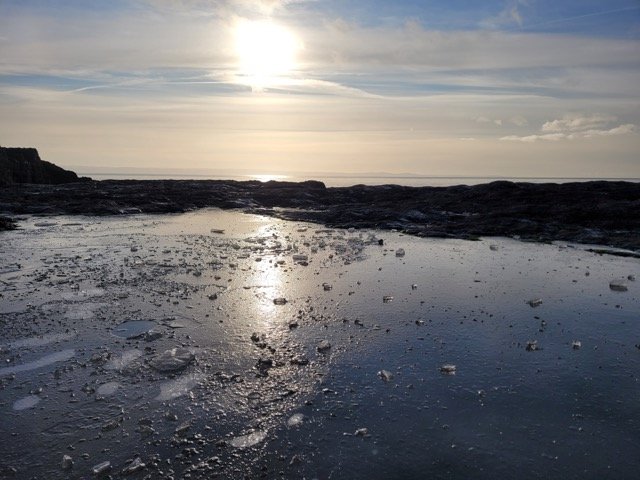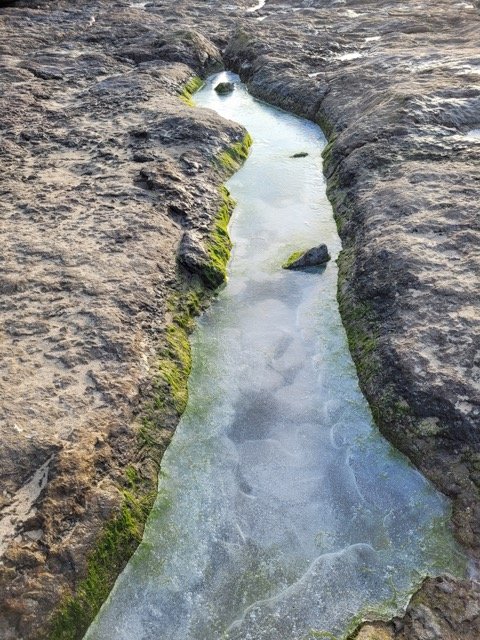Sker or Sker Point is a promontory between Porthcawl and Kenfig. It is notorious for shipwrecks. A memorial to the Samtampa, destroyed by storms at Sker in 1947, with great loss of life, is located there.
Ice on the rockpools and salt in the hail that lashed across the black shipwrecking hooks of Sker Point. I shrank into my coat, tugged my hood over my eyes and retreated.
Just a few yards inland, on the common, where the sea-plastic tumbles in drifts, things seemed calmer. A few numb sheep fumbled at the thin grass, turning their backs to the wind. I sank behind a pebble bank, poured myself hot sweet tea from the flask.
Tea, on a day like this, is a medicine. I poured myself another, began to relax, and noticed that the pebbles were moving. In twos and threes they rolled onto the common. Some were rolling toward me. A flock of rock pipits. Brave, plump, unobtrusive little birds, they will sometimes come very close, as if they don’t see anything but the tip of that thin beak, probing for sand fleas, snails, tiny crabs.
Undaunted creatures, I imagine their hot little hearts working in this place of ice and salt and stone, unresting engines, working hard where the blind elements collide, where the rock tears the sea and the sea breaks rocks against rocks and ice grows feathers, deepening the cracks in everything.
There’s a silence in the pipits, in their dark eyes fixed on the specks of nothing at their feet, it’s almost as if they are clockwork toys – someone wound them up and released them and so they go and go helplessly here and there scurrying and pecking until they drop.
Sker Point is a place of silences, a place where nothing happens regularly. It may be part of the reason why I come here, to listen to the silence. But hearing is a kind of touch, and everything touches you out here, we register everything on some level – even the absences.
Silence is particularly resonant in our age of disappearances. Books like Rachael Carson’s “Silent Spring,” registering the disastrous effects of chemical pesticides, have changed the way we read our world. Now, a quiet place can seem suspiciously like a place numbed in the aftermath of violence. In the last 50 years 30% of bird species have disappeared worldwide. Numbers continue to decline. In Britain the common species of my childhood, starlings, swifts, cuckoos, even sparrows, are now endangered, on the ‘red list.” The moths that once clouded around street lights on summer nights have gone.
I remember some strange diagrams I saw, engravings of the ideas of the philosopher Jakob Boehme – descriptions of the conflicting forces and sensations and desires in the mind of God that led to the creation of our painful, beautiful world and of the worlds beyond.
Boehme was a working man, a shoemaker, and one day, at his workbench, hunched over his tools, a shaft of light ignited the dust in the room and set his imagination on fire. He began to dream and think and write. His works inspired others, people like Blake and Coleridge, Hegel and Rilke.
“When you are quiet and silent,” he wrote, “then you are as God was before Nature and Creature; you are what God then was. You are that from which God made your Nature and Creature. Then you hear and see with that by which God saw and heard in you, even before your own Willing or your own Seeing began.”
I finish my tea and continue my retreat, back across the sighing dunes where the thorns flourish and the marsh deepens its reflection of the grey sky. Back eventually to the road through the village, busier now than ever before, where the cars seem to know which way to go, and their drivers, staring blankly at the open distance, plunge onwards into their own emptiness.
Images: Kristian Evans.
Listen to Kristian Evans read this entry at the Green Room, January 2023.





